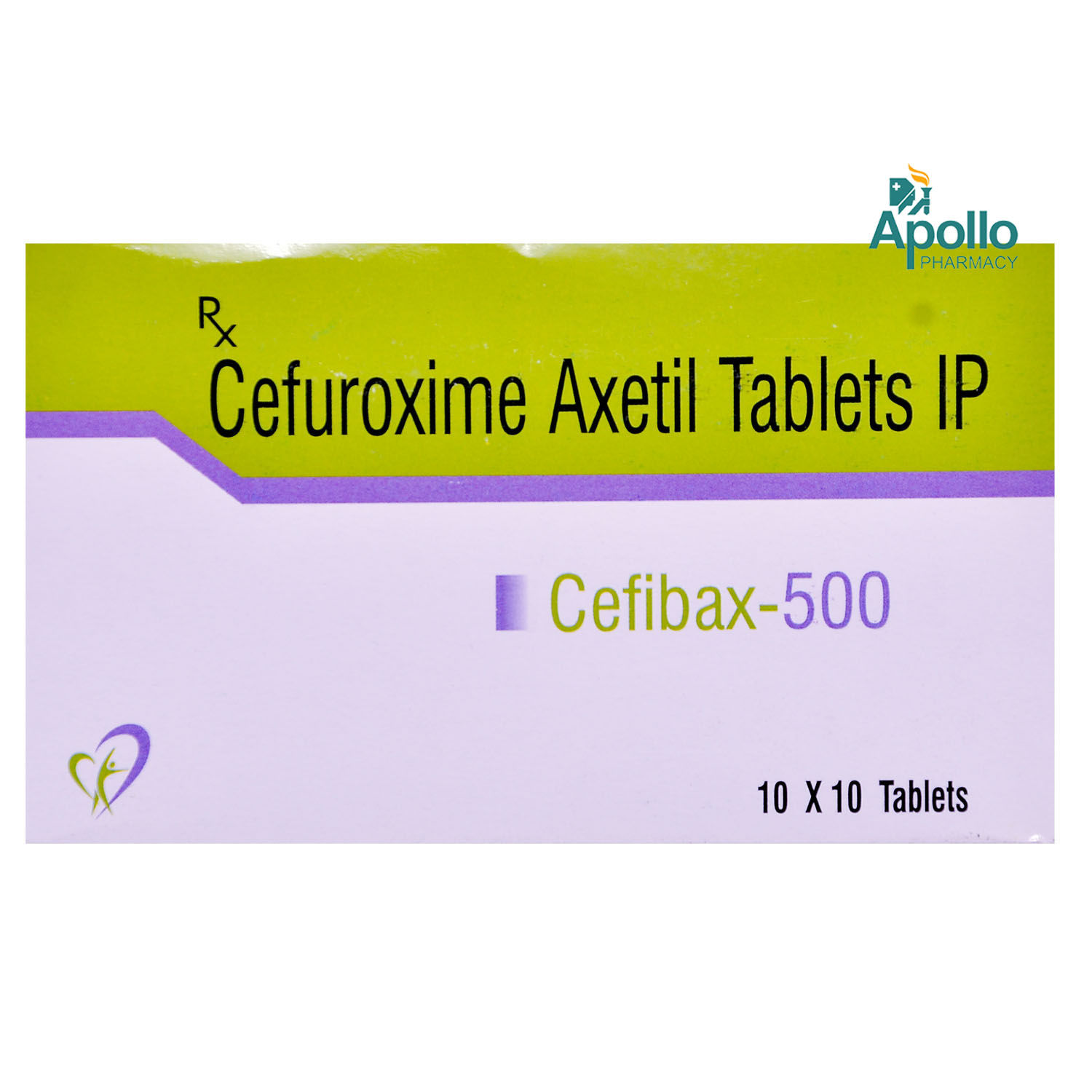Cefuroxime
About Cefuroxime
Cefuroxime belongs to the class of antibiotics known as cephalosporin, indicated for treating a wide range of bacterial infections. It helps in the treatment of urinary tract infections, respiratory tract infections, uncomplicated gonorrhoea (sexually transmitted infection), and Lyme disease.
Cefuroxime contains Cefuroxime, a broad-spectrum antibiotic which works by blocking the activity of the enzyme that makes peptidoglycan (a vital component of the bacterial cell wall). As a result, the bacterial cell cannot grow and multiply and finally gets killed.
Cefuroxime may cause side effects like headache, dizziness, stomach upset, overgrowth of candida (fungal skin infection), and unpleasant taste in the mouth. These side effects usually resolve after some time. However, if these side effects persist, consult your doctor.
Do not take Cefuroxime if you are allergic to any of its components. Consult your doctor if you are pregnant or breastfeeding. Keep your doctor informed about your health conditions and medications to prevent any potential interactions.
Uses of Cefuroxime
• Bacterial Infections: Cefuroxime is commonly used to treat various bacterial infections, including respiratory tract infections, urinary tract infections, ear Infections, and skin infections.
• Treatment of Bronchitis: Cefuroxime can help treat bronchitis, an infection of the airway tubes leading to the lungs, by targeting the underlying bacterial cause.
• Treatment of Gonorrhea: Cefuroxime treats gonorrhea, eliminating the bacteria and alleviating symptoms.
• Treatment of Lyme Disease: Cefuroxime can be used to treat Lyme disease, a bacterial infection caused by tick bites, helping to eliminate the bacteria and manage symptoms.
• Treatment of Throat or Tonsil Infections: Cefuroxime can be used to treat bacterial infections of the throat or tonsils, helping to relieve symptoms.
• Treatment of Sinusitis: Cefuroxime can effectively treat sinus infections caused by susceptible bacteria, alleviating symptoms like nasal congestion and facial pain.
• Pneumonia Treatment: Cefuroxime is sometimes prescribed to treat pneumonia, especially community-acquired infections, helping patients recover faster.
Medicinal Benefits
- Cefuroxime is a broad-spectrum antibiotic used to treat a wide variety of bacterial infections caused by both gram-positive and gram-negative bacteria.
- It is highly effective in the treatment of respiratory tract infections, ear infections, skin and soft tissue infections, genitourinary tract infections, and bone infections.
- In addition to treating active infections, Cefuroxime is also prescribed to prevent the spread of infections following a surgical procedure.
- It is also used in the early treatment of Lyme disease, caused by the bacterium Borrelia burgdorferi, in adults and children over 12 years of age.
- Cefuroxime demonstrates strong antibacterial activity against a range of bacteria, including Staphylococcus aureus, Streptococcus pneumoniae, Streptococcus pyogenes, Haemophilus influenzae, Haemophilus parainfluenzae, Klebsiella pneumoniae, Moraxella catarrhalis, and Neisseria gonorrhoeae.
Directions for Use
- Cefuroxime can be taken with or without food as advised by your doctor.
- Follow your doctor's instructions on the dosage and timing of this medication.
- Swallow Cefuroxime as a whole with a glass of water.
- Do not crush, break, or chew it.
Storage
Side Effects of Cefuroxime
- Headache
- Dizziness
- Stomach upset
- Overgrowth of Candida (fungal skin infection)
- Unpleasant taste in the mouth
Drug Warnings
- Do not take Cefuroxime if you are allergic to any of its components.
- Cefuroxime may cause Clostridioides difficile-associated diarrhoea (CDAD). If you experience severe, persistent diarrhoea, or if you find blood or mucus in your stools, consult your doctor immediately.
- Consult your doctor if you are pregnant or breastfeeding.
- Let your doctor know if you have pre-existing medical conditions or are taking any other medicines, including supplements and herbal products.
Drug Interactions
Drug-Drug Interactions: You should avoid taking Cefuroxime with oral birth control pills, medicines that reduce gastric acidity (like antacids, omeprazole), immunosuppressing drugs (mycophenolate or mycophenolic acid), medicines used for reducing uric acid (probenecid), and some urine glucose tests. Besides this, it also interacts with typhoid and BCG vaccines.
Drug-Food Interactions: Grapefruit juice and dietary supplements containing minerals like calcium may dampen the effect of antibiotics.
Drug-Disease Interactions: Inform your doctor if you have colitis, kidney disease, dialysis, liver disease, epilepsy (fits) or diarrhoea.
Drug-Drug Interactions Checker List:
Safety Advice

Alcohol
unsafeYou are recommended not to consume alcohol along with Cefuroxime.

Pregnancy
safe if prescribedCefuroxime is a pregnancy category B drug. So, Cefuroxime can be safely taken by pregnant women if prescribed by the doctor.

Breast Feeding
cautionCefuroxime is excreted in human milk; caution should be exercised. Your doctor will weigh the benefits and any potential risks before prescribing it to you.

Driving
cautionNo studies on the effects on the ability to drive and use machines have been performed. However, as this medicine may cause dizziness, patients should be warned to be cautious when driving or operating machinery.

Liver
cautionConsult your doctor; there is no substantial research yet on the use of Cefuroxime in patients with liver problems.

Kidney
cautionConsult your doctor, as there is no substantial research yet on the use of Cefuroxime in people with kidney problems.

Children
safe if prescribedCefuroxime can be given safely to children provided the dose has been prescribed by a child specialist. However, there is no clinical evidence of using Cefuroxime in children under the age of 3 months.
Habit Forming
Diet & Lifestyle Advise
- It would be best to take probiotics after taking the full course of Cefuroxime to restore some of the healthy bacteria in the intestine that may have been killed. Taking probiotics after antibiotic treatment can reduce the risk of antibiotic-associated diarrhoea. Certain fermented foods like yoghurt, cheese, sauerkraut and kimchi can help restore the intestine's good bacteria.
- Include more fibre-enriched food in your diet, as it can be easily digested by gut bacteria, which helps stimulate their growth. Thus, fibre foods may help restore healthy gut bacteria after taking a course of antibiotics. Whole grains like whole-grain bread and brown rice should be included in your diet.
- Avoid taking too much calcium-enriched foods and drinks, as it might affect the working of Cefuroxime.
- Avoid intake of alcoholic beverages with Cefuroxime as it can make you dehydrated and affect your sleep. This can make it harder for your body to aid the Cefuroxime in fighting off infections.
Patients Concern
Disease/Condition Glossary
Bacterial infection: It is a condition in which harmful bacteria enter, multiply and infect our body. It can target any body part and multiply very quickly. When you get infected with bacteria, you can experience generalised symptoms like fevers, chills, and fatigue. Anyone can become infected with a bacterial infection. But, people with weak immune systems or taking immunosuppressive medicine can make them more prone to bacterial infection.
FAQs
Cefuroxime is used to treat a wide range of bacterial infections. It helps in the treatment of urinary tract infections (UTI), mild to moderate lower respiratory tract infections (bronchitis), severe lower respiratory tract infections (pneumonia), pyelonephritis (kidney inflammation due to the bacterial infection), uncomplicated gonorrhoea (sexually transmitted infection), and Lyme disease (caused due to biting of infected black-legged tick insect).
Cefuroxime is a broad-spectrum antibiotic that kills a wide range of bacteria (bactericidal). It kills the bacterial cell by binding to the outer layer of the bacteria and blocking the activity of the enzyme that makes peptidoglycan (a vital component of the bacterial cell wall). As a result, the bacterial cell cannot grow and multiply and finally gets killed.
No, it is a prescribed drug, given by a physician for preventing specific medical conditions. Taking it on your own can cause unwanted side effects.
You should avoid taking Cefuroxime with oral birth control pills, medicines that reduce gastric acidity (like antacids, omeprazole), immunosuppressing drugs (mycophenolate or mycophenolic), medicines used for reducing uric acid (probenecid), and some urinary glucose tests. Besides this, it also interacts with typhoid and BCG vaccines.
Depending upon the severity of your medical condition, your doctor may prescribe it to you daily for a specific duration. The usual dose of Cefuroxime is 5-10 days, but depending on your current infection state, your doctor may extend your dose intake for more days.
Try to stay well hydrated by drinking at least six glasses of water or other fluids per day. Keep your underwear clean and try to use cotton underwear to avoid the spread of infection. Always keep your bladder empty as much as possible by peeing regularly. Your doctor may prescribe cranberry juice with antibiotics to treat a urinary tract infection.
After taking an antibiotic, you may need to wait for up to three hours before eating or drinking any dairy products, including milk, butter, yoghurt, and cheese. Grapefruit juice and dietary supplements containing minerals like calcium may also work to dampen the effect of antibiotics.
If you have taken an accidental overdose of Cefuroxime, you may have diarrhoea, nausea or vomiting. In rare cases, it can also cause convulsions or seizures (fits). Try to reach out to the doctor in this case.
No. Cefuroxime treats only bacterial infection. Cough, flu or cold are usually caused by viruses. So, you should consult a doctor for these conditions.
Yes. Cefuroxime may interact with birth control pills and lower their efficiency. So, you should tell your doctor if you are using any birth control pills.
No. You should complete the full course of Cefuroxime as your doctor prescribes. You must take Cefuroxime at the right dose, times, and for the right number of days.
Cefuroxime might be a safer alternative if you are allergic to amoxicillin. However, please consult the doctor before starting Cefuroxime.
Cefuroxime helps treat respiratory tract infections, ear infections, skin infections, genitourinary infections, and bone infections.
Cefuroxime may cause dizziness in some cases. Therefore, drive or operate machinery only if you are alert.
Do not discontinue Cefuroxime without consulting the doctor. To treat your infection effectively, continue taking Cefuroxime for the prescribed duration even though you feel better.
If you miss a dose of Cefuroxime take it as soon as you remember, However, if it is almost time for the scheduled dose, skip the missed dose and take the next dose at the scheduled time.
Cefuroxime may interact with other medications. Consult the doctor if you are taking oral birth control pills, antacids, immuno-suppressing drugs, or medicines used for reducing uric acid.
Avoid alcohol consumption as it might lower the effectiveness of Cefuroxime.
Cefuroxime can be taken by pregnant or breastfeeding women if prescribed by the doctor. Please consult the doctor if you are pregnant, think you are pregnant, planning for pregnancy or breastfeeding.
Side effects of Cefuroxime include headache, dizziness, stomach upset, overgrowth of candida (fungal skin infection), and an unpleasant taste in the mouth. Consult the doctor if the side effects persist or worsen.





